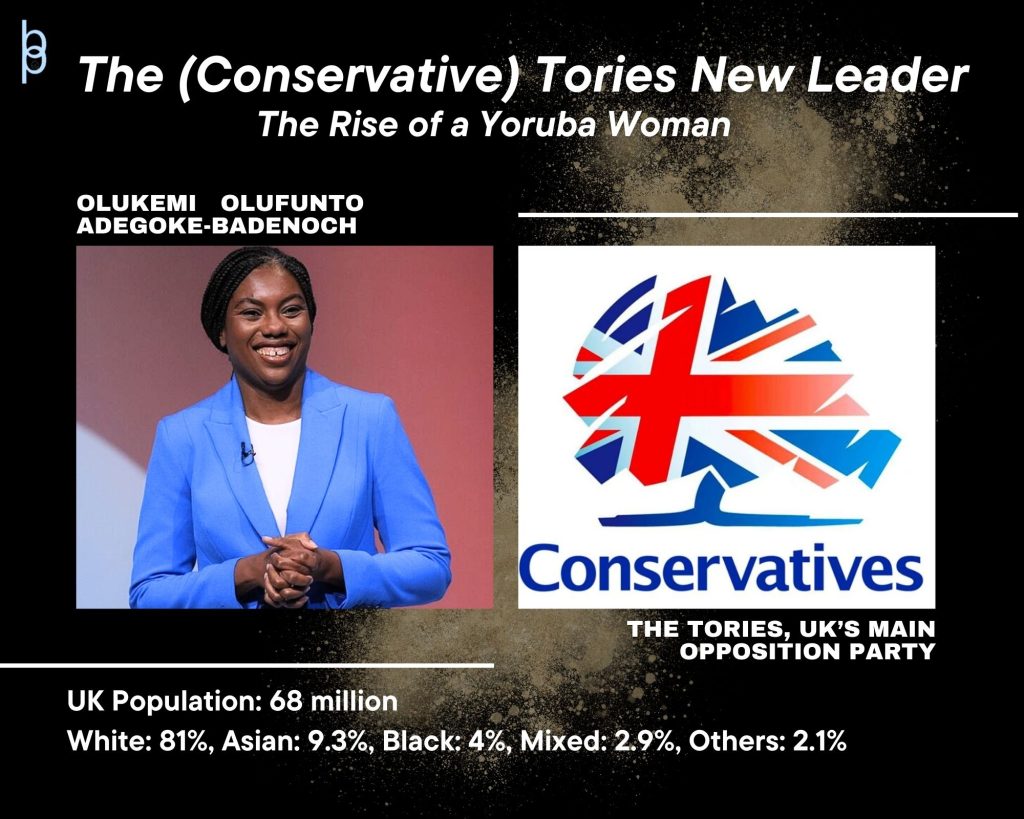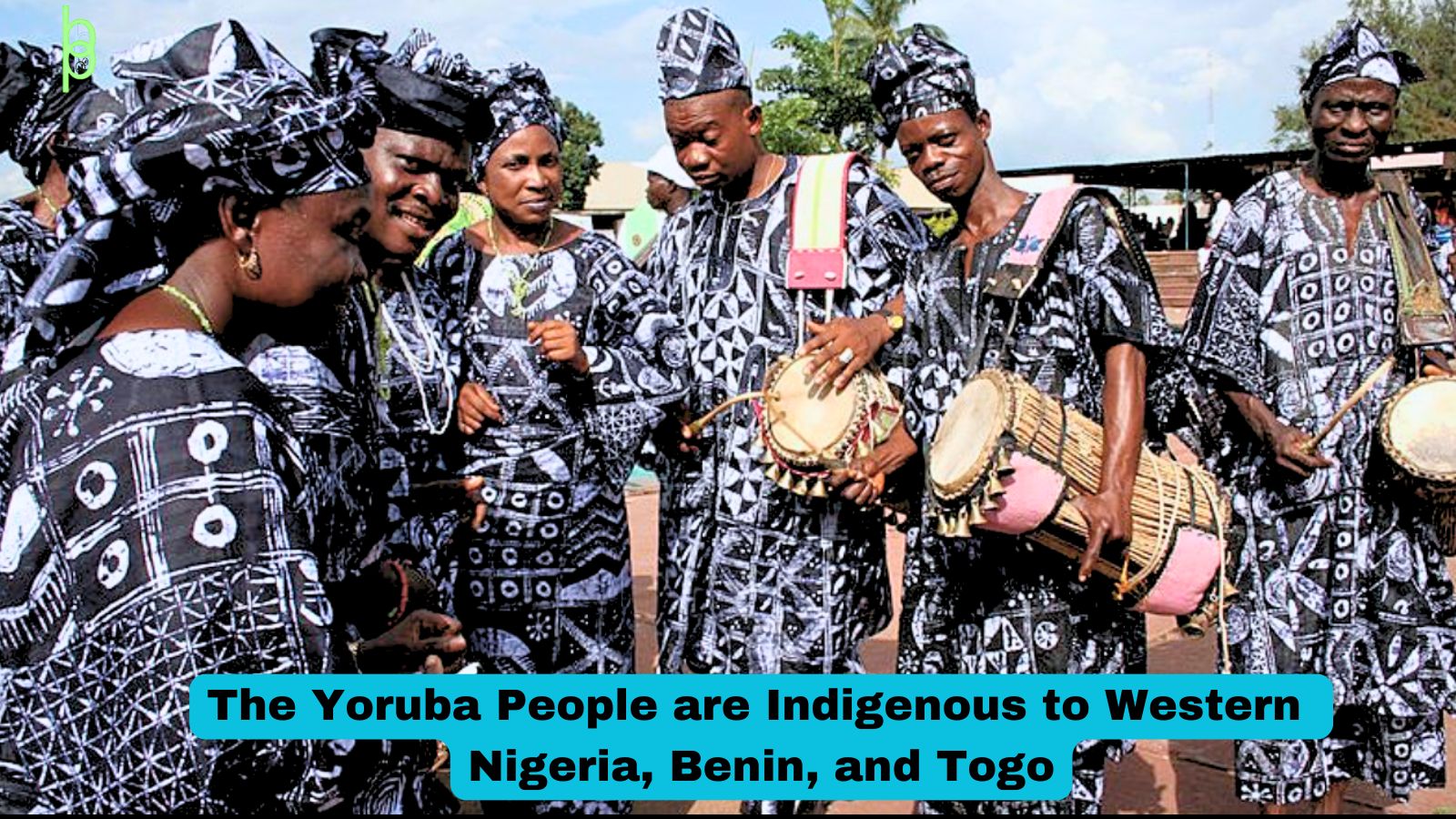
A British-Yoruba Woman Becomes the Leader of the UK’s Main Opposition Party
Olukemi Olufunto Adegoke, a Yoruba woman from present-day Nigeria, married Hamish Badenoch, thus Kemi Badenoch. Like many other Black individuals with European citizenship, Europeans’ generosity, tolerance, and hospitality granted her this status. However, as anti-immigration sentiment grows across Europe, many indigenous Europeans feel anxious about the rapidly changing demographic landscape.
“Olukemi Olufunto Adegoke-Badenoch, as a Yoruba, cannot run for governor or any leadership position in the other thirty Nigerian states that are not Yoruba. However, she can run for the leadership of the main opposition party in the United Kingdom, which technically puts her one step toward becoming the prime minister.”
It is important to note that Europeans are not inherently intolerant, inhospitable, or violent. Contrary to popular belief, Caucasians often demonstrate remarkable tolerance and generosity. Kemi Badenoch’s situation highlights some of these tensions. Olukemi Olufunto Adegoke-Badenoch, as a Yoruba, cannot run for governor or any leadership position in the other thirty Nigerian states that are not Yoruba. However, she can run for the leadership of the main opposition party in the United Kingdom, which technically puts her one step toward becoming the prime minister.

The rise of Kemi Badenoch, whose full name is Olukemi Olufunto Adegoke-Badenoch, to a leadership position in the main opposition party is a crucial factor fuelling anti-immigration sentiments in the UK and Europe. Some argue that Black, Asian, and non-White individuals who hold British and European citizenship should avoid pursuing leadership roles in various European countries to maintain societal cohesion. They contend that nationality, ethnicity, and race are essential components of citizenship and that simply acquiring a European passport does not make one European.
Conversely, Europeans typically do not seek to hold presidential or ministerial positions in countries like Nigeria, Ghana, Cameroon, or Senegal. The question arises: Why is this the case?
“Being European involves more than merely sounding or bearing a European passport.”
The United States differs from Europe; it was founded by Europeans who colonised the land, and various European immigrants and enslaved Africans later settled there. However, Europe is predominantly Caucasian and has a long-standing cultural history. The notion is that individuals cannot simply relocate to Europe—primarily for financial reasons—and have children, and suddenly, these children are Europeans. Being European involves more than merely sounding or bearing a European passport. People tolerated this when the numbers were low, but the reality has drastically changed as these numbers exponentially increased. For instance, 9% to 14% of the UK population identifies as Asian or Black, and similar demographics are reflected in countries like France, Sweden, Belgium, Portugal, and the Netherlands.
Many Black Europeans today come from immigrant backgrounds, often beginning their journeys through breaches of immigration laws or as asylum seekers. They are drawn by the hope of a better life in Europe and driven by the challenges they face in their home countries, like corruption and conflict. The visibility of individuals with backgrounds in Africa and Southeast Asia who represent Europe internationally has led to a notable increase in immigration from these regions over the last few decades. They share a common goal: better economic opportunities.
For too long, immigrants have taken advantage of the tolerance and hospitality offered by Caucasian Europe. Until non-White immigrants in the UK and Europe recognise that their citizenship is a privilege—not an automatic right—and refrain from seeking political leadership positions, there could be escalating an already developing schism between indigenous and non-indigenous Europeans. That schism has evoked anti-immigration sentiment that might eventually lead to conflict between the indigenous population and the new immigrants. Citizenship in a new country is a privilege; those granted this status should be cautious about overstepping boundaries. At a time when political correctness is at the forefront of discourse, it is crucial to emphasise that the desire to protect one’s ethnic identity is not inherently racist.
Olukemi Olufunto Adegoke-Badenoch is of Yoruba descent and is from present-day Nigeria. Nigerians widely acknowledge this fact and do not debate it.
by Ikechukwu ORJI






I like your view here.
“Until non-White immigrants in the UK and Europe recognise that their citizenship is a privilege—not an automatic right—and refrain from seeking political leadership positions, there could be escalating an already developing schism between indigenous and non-indigenous Europeans”.
But do you think our people will listen?
Well done 👍
They will never listen.